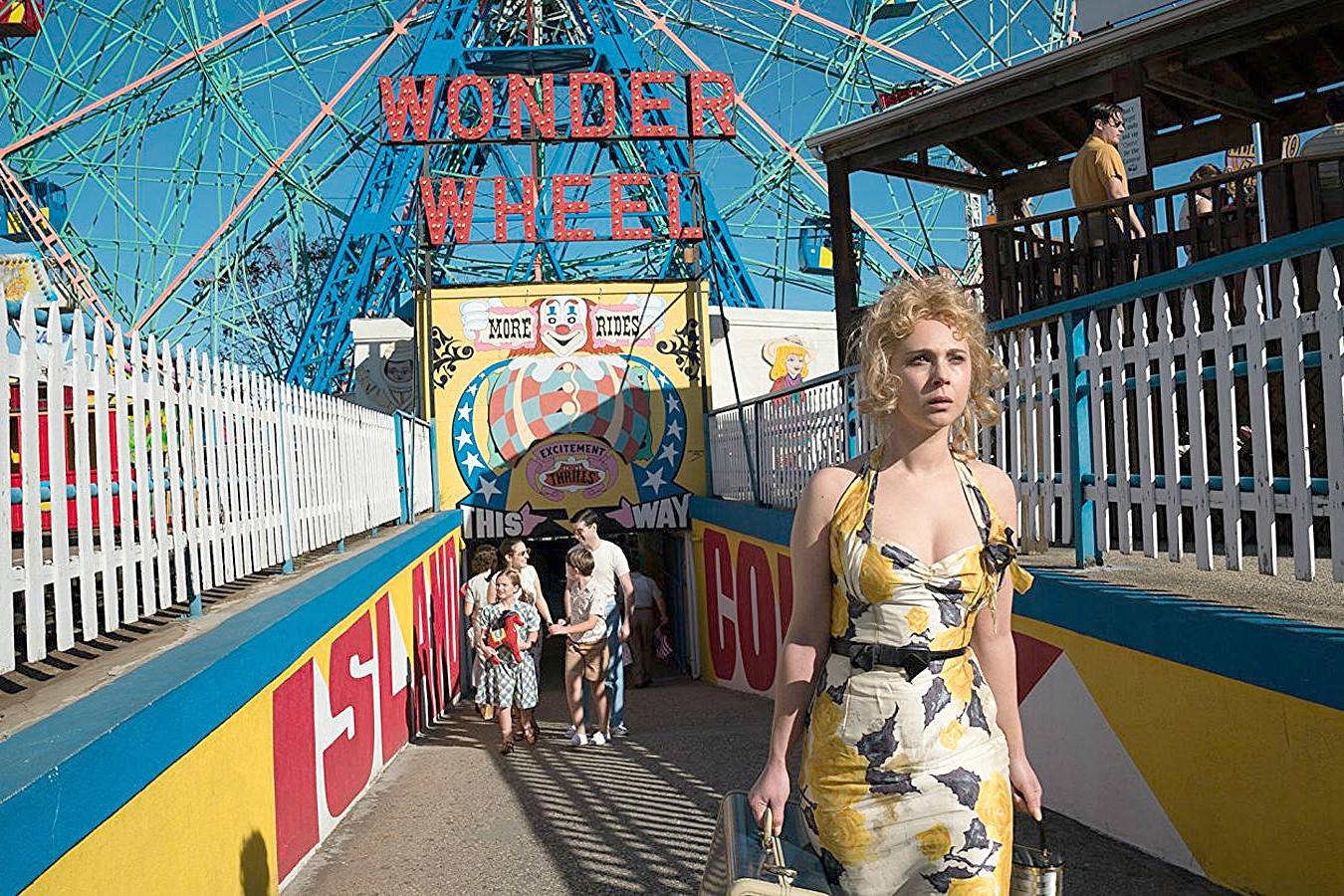There are a handful of dialogue-free moments in Wonder Wheel, and they come as an enormous relief. Woody Allen’s talky drama—the 48th feature for the 82-year-old director—has a small group of characters yammering at each other for much of its 101 minutes. But there are a couple of times when the central figure, Ginny (Kate Winslet), is allowed to be alone with herself and her thoughts. Ginny frets, or flips through her movie magazines, or ponders doing something terrible in order to cling to the slim thread of pleasure she has recently had in her life. For a few seconds the movie breathes, partly because a terrific actress is allowed to bring her power into the space—and partly because these are among the only moments in the film when everybody isn’t trying way, way too hard to make something happen.
Ginny lives in Coney Island in the 1950s—literally in the middle of the amusement park, under the lights of the big Wonder Wheel attraction. She’s a waitress at a clam house there; her loutish husband Humpty (Jim Belushi) tinkers with the rides. They have a young son (Jack Gore) who likes setting things on fire. In the course of a warm summer, unhappy Ginny is swept off her feet by a younger lifeguard, Mickey (Justin Timberlake), whose cheerfully pretentious ideas about playwrighting give the film its rare bits of humor. In creating this milieu, Allen goes in the direction he tried in Blue Jasmine: kitchen-sink Americana reminiscent of notable mid-century playwrights like Tennessee Williams and Clifford Odets. Humpty acts like he’s stepped out of a community theater production of A Streetcar Named Desire, and Mickey rattles on with his night-school psychology about how characters in drama bring about their own downfall.
That insight fits the film’s people, so when Humpty’s daughter from a previous marriage, Carolina (Juno Temple), abruptly returns to the fold, we know things will not work out well. Allen, who is fond of gangster-movie conventions, has Carolina fleeing a Mafioso husband, which puts her in danger from the mob but lets her hang around long enough to attract Mickey’s easily-diverted attention.
Yes, this is a film in which a middle-aged woman must deal with her lover falling for her stepdaughter. I will make a confession and say that while I was watching Wonder Wheel, I actually didn’t think about Woody Allen’s notorious elopement with the stepdaughter of his lover Mia Farrow, although that bit of personal history has figured large in the reviews of many film critics who now moonlight as psychoanalysts. If Wonder Wheel were more vivid, if there were a strong identification with Ginny and her anguish, maybe the autobiographical element would be worth teasing out. But—aside from an awkward scene involving Ginny’s impulsive gift to Mickey—the love story doesn’t draw blood.
Once again we have a Woody Allen film in which the scenes feel half-improvised by actors whose tones range all over the place. Compare Jim Belushi’s razor-sharp comic work in David Lynch’s Twin Peaks: The Return—a performance full of happily sprung line readings and precise body language—with his floundering here. Aside from Winslet’s committed turn, the reason to see Wonder Wheel is the rapturous cinematography by the legendary Vittorio Storaro. The man who shot The Conformist and Apocalypse Now floods the screen with blues and oranges, emphasizing the theatrical spirit of what we’re watching (it’s hinted that the movie may be Mickey’s play, which I guess excuses a lot of turgid plotting). If Allen seemed half as engaged with the material as Storaro obviously is, we might have something here.
Wonder Wheel is so-so late-period Woody, with too many intriguing touches to dismiss out of hand. What’s frustrating is that Allen seems uninterested in following his own instincts. The film needs more of Ginny’s inner life, and maybe more of that kid who sets fires. A little redhead, he looks like every young actor Allen has cast as his surrogate when dealing with childhood. In Wonder Wheel, this apparent alter ego keeps setting destructive fires. I want to know more about him. Opens Fri., Dec. 8 at various theaters. Rated PG-13
film@seattleweekly.com






